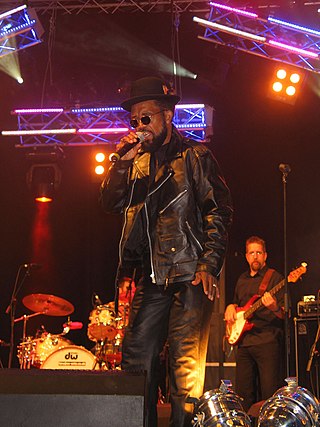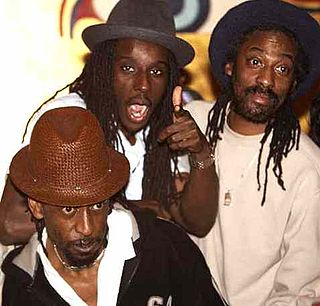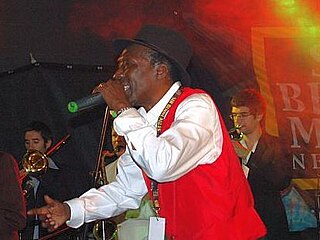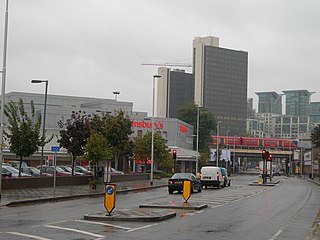Related Research Articles

Reggae is a music genre that originated in Jamaica in the late 1960s. The term also denotes the modern popular music of Jamaica and its diaspora. A 1968 single by Toots and the Maytals, "Do the Reggay", was the first popular song to use the word reggae, effectively naming the genre and introducing it to a global audience. Reggae is rooted out from traditional Jamaican Kumina, Pukkumina, Revival Zion, Nyabinghi, and burru drumming. Jamaican reggae music evolved out of the earlier genres mento, ska and rocksteady. Reggae usually relates news, social gossip, and political commentary. It is instantly recognizable from the counterpoint between the bass and drum downbeat and the offbeat rhythm section. The immediate origins of reggae were in ska and rocksteady; from the latter, reggae took over the use of the bass as a percussion instrument.
The music of Jamaica includes Jamaican folk music and many popular genres, such as mento, ska, rocksteady, reggae, dub music, dancehall, reggae fusion and related styles.

Cecil Bustamente Campbell, known professionally as Prince Buster, was a Jamaican singer-songwriter and producer. The records he released in the 1960s influenced and shaped the course of Jamaican contemporary music and created a legacy of work that would be drawn upon later by reggae and ska artists.

Rude boy is a subculture that originated from 1960s Jamaican street culture. In the late 1970s, there was a revival in England of the terms rude boy and rude girl, among other variations like rudeboy and rudebwoy, being used to describe fans of two-tone and ska. This revival of the subculture and term was partially the result of Jamaican immigration to the UK and the so-called "Windrush" generation. The use of these terms moved into the more contemporary ska punk movement as well. In the UK and especially Jamaica, the terms rude boy and rude girl are used in a way similar to gangsta, yardie, or badman.

Aswad are a British reggae group, noted for adding strong R&B and soul influences to the reggae sound. They have been performing since the mid-1970s, having released a total of 21 albums. Their UK hit singles include the number one "Don't Turn Around" (1988) and "Shine" (1994). "Aswad" is Arabic for "black". They are three-time Grammy Award nominees.

Alton Nehemiah Ellis was a Jamaican singer-songwriter. One of the innovators of rocksteady, he was given the informal title "Godfather of Rocksteady". In 2006, he was inducted into the International Reggae And World Music Awards Hall Of Fame.

Emmanuel "Rico" Rodriguez, also known as Rico, Reco or El Reco, was a Cuban-born Jamaican ska and reggae trombonist. He recorded with producers such as Karl Pitterson, Prince Buster, and Lloyd Daley. He was known as one of the first ska musicians. Beginning in the 1960s, he worked with The Members, The Specials, Jools Holland, and Paul Young.
There are several subgenres of reggae music including various predecessors to the form.
People from the Caribbean have made significant contributions to British Black music for many generations.
King Django is an American bandleader, singer, songwriter, arranger, engineer, producer, and multi-instrumentalist, especially in the genres of ska, rocksteady, reggae, dub, dancehall, rhythm & blues and soul. Other influences in his music have included traditional jazz, swing, klezmer, hardcore/punk rock, hip-hop and electronica.
Tommy McCook was a Jamaican saxophonist. A founding member of The Skatalites, he also directed The Supersonics for Duke Reid, and backed many sessions for Bunny Lee or with The Revolutionaries at Channel One Studios in the 1970s.

The A3036 is an A road in London, England, running from Waterloo to Wandsworth.
The Skatalites are a ska band from Jamaica. They played initially between 1963 and 1965, and recorded many of their best known songs in the period, including "Guns of Navarone." They also played on records by Prince Buster and backed many other Jamaican artists who recorded during that period, including Bob Marley & The Wailers, on their first single "Simmer Down." They reformed in 1983 and have played together ever since.
Victor Rice is an American bassist, composer and producer from Long Island, NY. Rice moved to New York City in 1985 to attend Manhattan School of Music, where he received his BM and MM degrees in orchestral performance under Homer Mensch and Linda McKnight, respectively. Rice started his career producing records for the record label Moon Ska Records the following year. In 1996, he moved to Stubborn Records and began engineering his own productions. He moved to São Paulo, Brazil in 2002 and built his own studio, Studio Copan where he is the sole engineer.
Fashion Records is a UK-based record label, publishing reggae music.

The Skints are an English reggae punk band from London, described by Clash Music as "the torchbearers for modern British reggae music." The Skints mix reggae, ska, dub, punk rock, dancehall, soul, and rap, touring extensively across the UK, Europe and the United States. Their album Swimming Lessons (2019) debuted at number 1 on the Billboard reggae chart. Their original style of music has been described as "tropical punk".
Roy Livingstone Plummer, better known as King Sounds, is a Jamaican reggae musician who released several albums from late 1970s onwards.
Sonny Roberts, often known as Sonny Orbitone, was a Jamaican record producer who had success within the British reggae market in the 1960s, 1970s and 1980s with his Planetone and Orbitone record labels.
Vincent George Forbes, better known as Duke Vin, was a Jamaican-born sound system operator and selector who operated the first sound system in the United Kingdom.
Wilbert Augustus Campbell, known as Count Suckle, was a Jamaica-born sound system operator and club owner who was influential in the development of ska and reggae music, and African-Caribbean culture, in the United Kingdom.
References
- 1 2 "Multicultural London | Buy the rudest sounds". Time Out . 31 May 2006. Archived from the original on 15 October 2012.
- 1 2 "About Dub Vendor". Dub Vendor. Retrieved 3 September 2020.
- ↑ "Dub Vendor farewell party". ITZ Caribbean. Archived from the original on 27 February 2009. Retrieved 3 September 2020.
- ↑ Tom Goodwyn (1 September 2011). "Reggae record shop Dub Vendor to close after 35 years due to riot damage". NME . Retrieved 11 November 2020.
- ↑ "Dub Vendor: The lion sleeps as reggae shack closes doors". The Independent . 30 August 2011. Retrieved 3 September 2020.